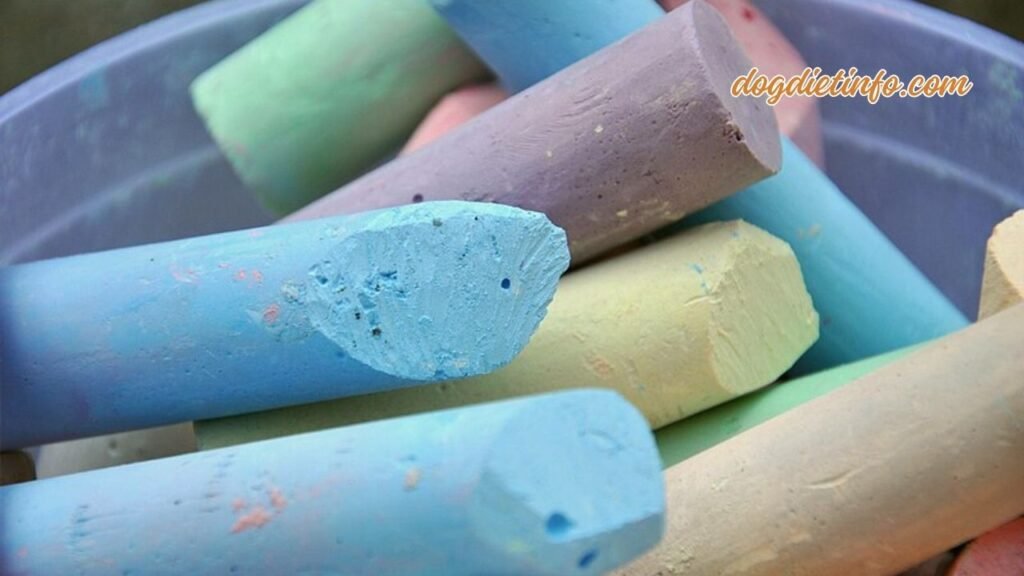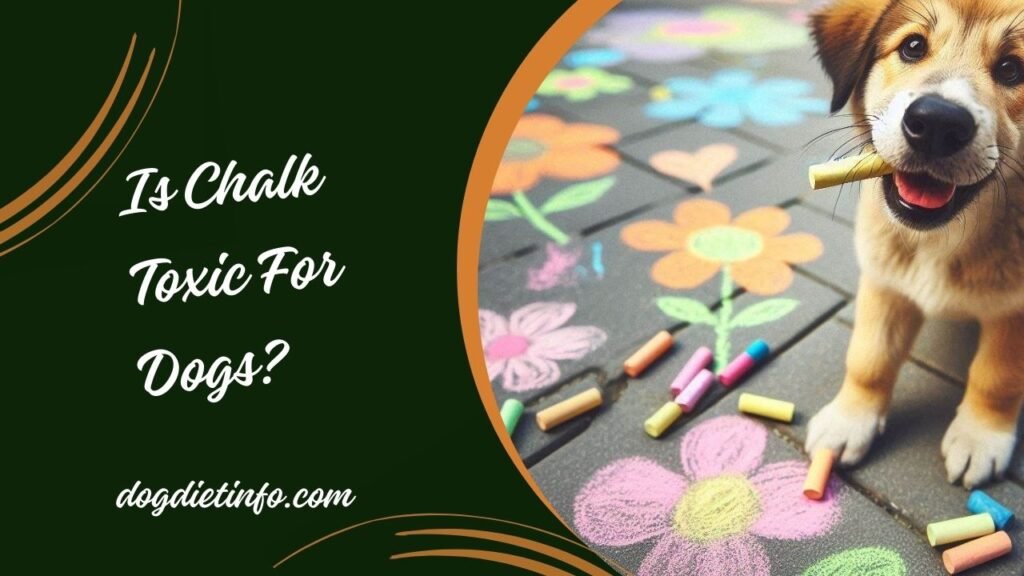Is Chalk Toxic For Dogs? Chalk is generally non-toxic for dogs, but ingesting large amounts could cause mild gastrointestinal upset.
As pet owners, our primary concern is always the health and well-being of our furry companions. Dogs, by their very nature, are curious creatures and often get into things they shouldn’t—whether it’s food, household items, or objects found outdoors.
Chalk, an item frequently used in schools, homes, and for outdoor activities, is one such object that a dog might come across.
Whether used for drawing on sidewalks or writing on chalkboards, chalk may pique a dog’s interest, making pet owners wonder: Is chalk toxic for dogs?
In this article, we’ll explore everything you need to know about chalk and how it affects dogs. From understanding what chalk is made of to determining the potential risks associated with it, we’ll cover everything you need to ensure your pet’s safety.
Contents
What Is Chalk?
Composition of Chalk
Chalk is primarily composed of two main substances: calcium carbonate and calcium sulfate. Both of these materials are naturally occurring and are commonly found in the environment.
Calcium carbonate is often sourced from limestone or shells, while calcium sulfate is the mineral form of gypsum. [Is Chalk Toxic For Dogs?]
These ingredients are generally safe for humans and are often used in various industries, including construction and agriculture.
Because chalk is made from natural compounds, it is not considered toxic. In fact, calcium carbonate is sometimes found in over-the-counter antacids for humans.
However, it’s important to note that just because something is safe for humans doesn’t always mean it’s entirely safe for dogs.
Types of Chalk Commonly Found
Chalk comes in various forms, depending on its intended use. Some of the most common types include:
- Sidewalk Chalk: Large, colorful sticks typically used by children for outdoor drawings on pavements.
- Blackboard Chalk: Thin, white or colored chalk used for writing on traditional chalkboards in classrooms or at home.
- Art Chalk: Often softer and used by artists for sketching or drawing. [Is Chalk Toxic For Dogs?]
These different types of chalk may have slight variations in their composition, particularly in the pigments used to create colors, but they are all generally non-toxic for humans and animals.
Is Chalk Toxic For Dogs?
Non-Toxic Nature of Chalk
The good news is that chalk, in its most common forms, is generally non-toxic for dogs. If your dog accidentally licks or consumes a small amount of chalk, there’s no need to panic. Most forms of chalk do not contain any ingredients that are harmful to dogs in small quantities.
However, this doesn’t mean that chalk is entirely without risks. Like many non-food items, chalk can cause problems if ingested in large quantities or if it poses a choking hazard.
Potential Gastrointestinal Upset
While chalk itself is not toxic, consuming a large amount of it can still lead to gastrointestinal issues in dogs.
If your dog eats a significant amount of chalk, they may experience symptoms such as vomiting, diarrhea, or a mild upset stomach. This is because chalk is not easily digestible, and the body may react to expel it.
In most cases, these symptoms will be mild and resolve on their own without medical intervention.
However, if your dog eats a large quantity of chalk and begins to show signs of distress, such as excessive vomiting, lethargy, or loss of appetite, it’s a good idea to consult your veterinarian.
What to Do If Your Dog Eats Chalk
If you suspect that your dog has eaten chalk, the first step is to monitor their behavior closely. Watch for any signs of digestive upset, such as vomiting or diarrhea, as well as any changes in behavior like lethargy or refusal to eat.
In most cases, if the amount of chalk ingested was small, your dog will be fine without any need for intervention. [Is Chalk Toxic For Dogs?]
If your dog has consumed a larger amount or you notice signs of discomfort, contact your veterinarian for guidance. They may recommend bringing your dog in for an examination to ensure there are no blockages or complications.
Differences Between Sidewalk Chalk and Regular Chalk
When it comes to safety, there isn’t much difference between the various types of chalk. Both sidewalk chalk and blackboard chalk are typically made from similar materials, and both are considered non-toxic in small amounts.
The main difference is that sidewalk chalk is often larger and more colorful, which may make it more appealing to dogs who enjoy chewing on things.
That said, it’s important to keep all forms of chalk out of reach of your pets to avoid any potential risks. [Is Chalk Toxic For Dogs?]
Choking Hazards
One of the more significant concerns about dogs and chalk is the risk of choking. If your dog manages to chew off a large chunk of chalk, there’s a possibility that it could become lodged in their throat or digestive tract, leading to a choking hazard or even an intestinal blockage.
To avoid this, make sure to supervise your dog when they are near objects they might chew on, including chalk.
If your dog is prone to chewing on things, consider providing safe alternatives, such as chew toys designed specifically for dogs. [Is Chalk Toxic For Dogs?]

Can Chalk Dust Be Harmful to Dogs?
Inhalation of Chalk Dust
Chalk dust, though generally non-toxic, can be an irritant if inhaled by your dog. Dogs with respiratory conditions, such as asthma or allergies, might be more sensitive to chalk dust. Inhaling too much of it could lead to sneezing, coughing, or nasal discharge.
If your dog has been exposed to a large amount of chalk dust, it’s a good idea to move them to a well-ventilated area and monitor their breathing. [Is Chalk Toxic For Dogs?]
While inhaling small amounts of chalk dust is unlikely to cause serious harm, prolonged exposure should be avoided, especially in dogs with respiratory sensitivities.
Skin and Eye Irritation
In rare cases, chalk dust can also cause minor irritation to a dog’s skin or eyes. If your dog has sensitive skin, they might develop mild redness or itching after coming into contact with chalk dust. Similarly, if chalk dust gets into your dog’s eyes, it can cause discomfort or irritation.
If your dog experiences any skin or eye irritation, simply rinse the affected area with clean water. If the symptoms persist, contact your veterinarian for further advice.
Is Colored Chalk Dangerous for Dogs?
Non-Toxic Dyes in Colored Chalk
Many types of chalk, particularly sidewalk chalk, come in a variety of vibrant colors. The dyes used in these types of chalk are generally non-toxic and safe for both humans and pets.
These pigments are often derived from food-grade materials or natural sources, making them safe for contact. [Is Chalk Toxic For Dogs?]
That being said, while the dyes in colored chalk are not harmful, it’s still important to prevent your dog from eating large amounts of colored chalk, as it could lead to the same digestive issues as white chalk.
Allergic Reactions to Dyes
Though uncommon, some dogs may be allergic to the dyes or pigments used in colored chalk. If your dog shows signs of an allergic reaction—such as itching, swelling, or redness—after coming into contact with colored chalk, consult your veterinarian.
In most cases, allergic reactions can be treated with antihistamines or other medications as recommended by your vet. [Is Chalk Toxic For Dogs?]
How to Prevent Your Dog from Eating Chalk
Keep Chalk Out of Reach
Prevention is the best way to ensure your dog doesn’t accidentally ingest chalk. Always store chalk in a secure place where your dog cannot access it.
This is especially important if you have a dog that likes to chew on objects. Chalk should be kept in cabinets, drawers, or other areas where pets can’t reach it.
Provide Safe Chewing Alternatives
If your dog is the type that loves to chew on things, it’s important to provide them with safe alternatives. [Is Chalk Toxic For Dogs?]
Chew toys, dental treats, or puzzle toys can be great options for satisfying your dog’s chewing instincts while keeping them safe. Always choose toys that are specifically designed for dogs to ensure their safety.
What Are the Long-Term Effects of Eating Chalk?
Impact on Digestive System
While occasional consumption of chalk is unlikely to cause long-term harm, repeated ingestion could have a more significant impact on your dog’s digestive system. [Is Chalk Toxic For Dogs?]
Chalk, particularly when consumed in large quantities, can lead to chronic gastrointestinal issues like constipation, bloating, or irritation of the stomach lining.
Dental Health Considerations
Chewing on hard objects like chalk can also damage your dog’s teeth over time. Chalk may be softer than other materials, but it can still lead to wear and tear on your dog’s teeth, especially if they chew on it regularly. Providing safer chew toys can help protect your dog’s dental health.
Final Verdict
In conclusion, chalk is generally non-toxic for dogs, but it’s not something they should be eating.
Small amounts of chalk are unlikely to cause serious harm, but consuming large quantities could lead to digestive upset, choking, or even intestinal blockages.
Additionally, chalk dust can be an irritant if inhaled or if it comes into contact with your dog’s eyes or skin. [Is Chalk Toxic For Dogs?]
To keep your dog safe, always store chalk out of their reach and provide them with safe, dog-friendly alternatives for chewing.
If your dog does eat chalk and shows signs of discomfort, don’t hesitate to reach out to your veterinarian for advice.
See Also: Are Carob Chips Safe For Dogs?
FAQs
Can dogs safely play with chalk?
While chalk is non-toxic, it’s not a good idea to let your dog play with or chew on it, as it can cause choking or gastrointestinal issues.
What should I do if my dog licks chalk dust?
Licking a small amount of chalk dust is unlikely to harm your dog, but be sure to clean their mouth and monitor them for any signs of discomfort.
How much chalk is too much for a dog to ingest?
Eating a small piece of chalk isn’t harmful, but if your dog eats a large amount, especially if they’re a small breed, contact your vet.
Are different colors of chalk more harmful?
No, colored chalk is typically made with non-toxic dyes that are safe for both children and animals. [Is Chalk Toxic For Dogs?]
Are there chalk alternatives that are safer for dogs?
It’s best to provide your dog with toys designed for chewing rather than letting them play with chalk.
Conclusion: Is Chalk Toxic For Dogs?
While chalk is generally considered safe for dogs, it’s important to take precautions to prevent your dog from eating it or playing with it unsupervised.
Chalk, especially in large amounts, can cause digestive issues or pose a choking hazard. Always keep chalk out of reach and provide your dog with safe alternatives like chew toys.
If your dog eats a large amount of chalk or shows signs of illness, consult your veterinarian promptly. [Is Chalk Toxic For Dogs?]
By understanding the potential risks and taking preventive measures, you can ensure that your dog stays safe and healthy around everyday items like chalk.

Derrick Wilcox is a certified canine behaviorist with over 12 years of experience at Happy Paws Animal Clinic and Pawsitive Training Center, helping pet owners ensure safer, healthier, and happier lives for their dogs.



